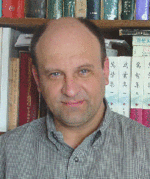Alexander Vovin, Date of Birth, Place of Birth
TweetAlexander Vovin
Russian-American japanologist
 Date of Birth: 27-Jan-1961
Date of Birth: 27-Jan-1961
 Place of Birth: Saint Petersburg
Place of Birth: Saint Petersburg
Profession: linguist
Nationality: United States
Zodiac Sign: Aquarius 
About Alexander Vovin
- Alexander Vladimirovich Vovin (Russian: ????????? ???????????? ?????; born 27 January 1961) is a Russian-American linguist and philologist, currently director of studies at the School for Advanced Studies in the Social Sciences (École des hautes études en sciences sociales (EHESS)) in Paris, France. Alexander Vovin earned his M.A.
- in structural and applied linguistics from the Saint Petersburg State University in 1983, and his Ph.D.
- in historical Japanese linguistics and premodern Japanese literature from the same university in 1987, with a doctoral dissertation on the Hamamatsu Chunagon Monogatari (ca.
- 1056).
- After serving as a Junior Researcher at the St.
- Petersburg Institute of Oriental Studies (1987–1990), Assistant Professor of Japanese at the University of Michigan (1990–1994), Miami University (1994–1995), and Assistant and Associate Professor at the University of Hawai'i (1995–2003), he became the full professor at the same university and continued working there until 2014.
- He has also been a visiting professor at the International Research Center for Japanese Studies, Kyoto (2001–2002, 2008), a visiting professor at the Ruhr University Bochum, Germany (2008–2009), and a visiting professor at the National Institute for Japanese Language and Linguistics (NINJAL) in Tokyo, Japan in May–August 2012. Alexander Vovin specializes in Japanese historical linguistics (with emphasis on etymology, morphology, and phonology), and Japanese philology of the Nara period (710–792), and to a lesser extent of the Heian period (792–1192).
- His most current project involves the complete academic translation into English of the Man'yoshu (ca.
- 759), the earliest and the largest premodern Japanese poetic anthology, alongside the critical edition of the original text and commentaries.
- He also researched the moribund Ainu language in northern Japan, and worked on Inner Asian languages and Kra–Dai languages, especially those preserved only in Chinese transcription, as well as on Old and Middle Korean texts.
Read more at Wikipedia

